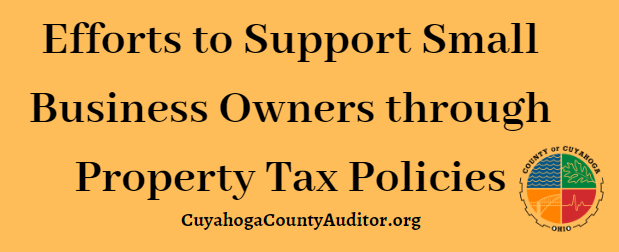Small businesses are the backbone of local economies, driving innovation, creating jobs, and contributing to vibrant communities. However, they often face numerous challenges, including navigating complex property tax policies. County auditors play a crucial role in supporting small business owners by implementing fair and equitable property tax policies. In this article, we will explore the efforts of county auditors to assist small business owners through property tax policies, highlighting their role, challenges faced by small businesses, and initiatives undertaken to alleviate tax burdens.
Introduction
County auditors are elected officials responsible for overseeing property tax assessments and ensuring compliance with tax laws. Their role is particularly significant for small business owners, who rely on fair and predictable tax policies to thrive. Property tax policies, which determine the amount of tax owed on real estate properties, can have a substantial impact on small businesses’ bottom line.
Role of County Auditors
Responsibilities and Duties of County Auditors
County auditors assess the value of properties within their jurisdiction and calculate property taxes based on assessed values and applicable tax rates. They also administer exemptions and credits and handle tax appeals and assessments.
Impact on Small Business Owners
The decisions made by county auditors directly affect small business owners, as property taxes are a significant expense for many businesses. High property tax burdens can strain small businesses’ finances and impede their ability to grow and invest in their operations.
Challenges Faced by Small Business Owners
Property Tax Burden
Small businesses often struggle with high property tax bills, especially in areas with escalating property values. Excessive tax burdens can threaten their viability and competitiveness, particularly for businesses operating on tight profit margins.
Understanding Tax Assessments
Navigating property tax assessments can be daunting for small business owners, who may lack the resources or expertise to challenge unfair assessments. Understanding the assessment process and appealing inaccurate valuations is essential for mitigating tax liabilities.
Efforts by County Auditors
County auditors recognize the challenges faced by small business owners and are actively working to support them through various initiatives:
Education and Outreach Programs
County auditors conduct educational seminars and workshops to help small business owners understand property tax policies, assessment procedures, and available resources. These programs empower businesses to advocate for their interests and navigate the tax system effectively.
Advocacy for Fair Taxation
County auditors advocate for fair and equitable property tax policies that balance the needs of businesses with the fiscal responsibilities of local governments. They work collaboratively with elected officials, community stakeholders, and advocacy groups to promote transparency and accountability in tax administration.
Support for Tax Relief Programs
County auditors administer tax relief programs, such as exemptions for qualifying businesses or properties, to alleviate the tax burden on small businesses. These programs provide financial assistance to eligible businesses and encourage economic development and investment in local communities.
Success Stories and Case Studies
County auditors’ efforts have resulted in positive outcomes for small businesses:
- In [County Name], Auditor [Name] implemented a tax relief program for small businesses adversely affected by the COVID-19 pandemic, providing much-needed financial relief to struggling businesses.
- [County Name] Auditor’s Office successfully challenged an erroneous property tax assessment, saving [Business Name] thousands of dollars in tax liabilities and preserving local jobs.
Collaboration with Small Business Communities
County auditors collaborate closely with small business communities to better understand their needs and concerns:
- They establish partnerships with business organizations, chambers of commerce, and industry associations to foster dialogue and exchange ideas on tax-related issues.
- County auditors actively seek feedback and input from small business owners through surveys, town hall meetings, and advisory committees, ensuring that their voices are heard in the policymaking process.
Future Outlook and Initiatives
County auditors remain committed to supporting small business owners and plan to undertake the following initiatives:
- Continuing education and outreach efforts to empower small business owners with knowledge and resources to navigate property tax policies effectively.
- Exploring innovative policy solutions, such as tax incentives for small businesses and streamlined assessment processes, to promote economic growth and prosperity.
Conclusion
County auditors play a vital role in supporting small business owners through fair and equitable property tax policies. By advocating for their interests, providing educational resources, and administering tax relief programs, county auditors help create an environment where small businesses can thrive and contribute to vibrant local economies.
